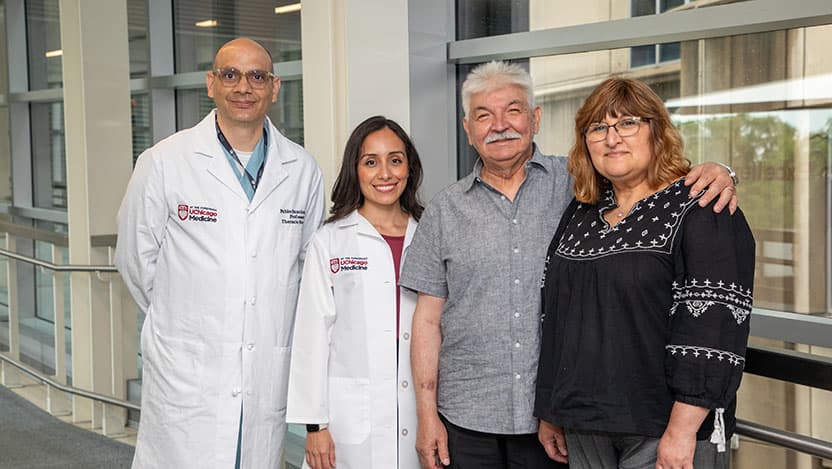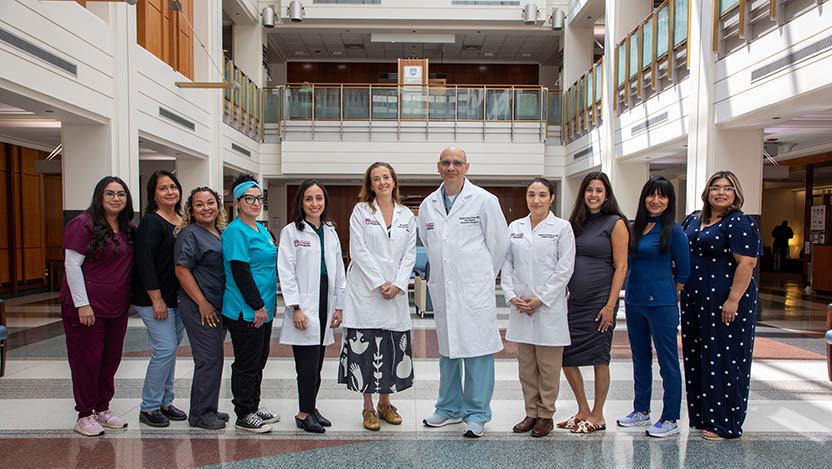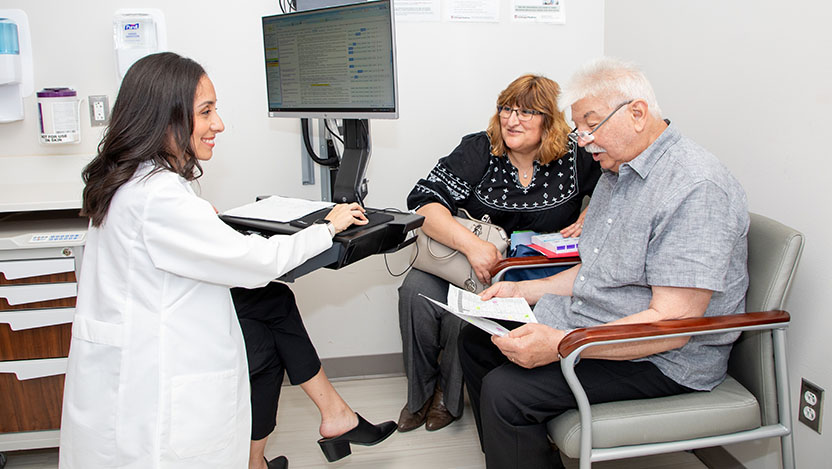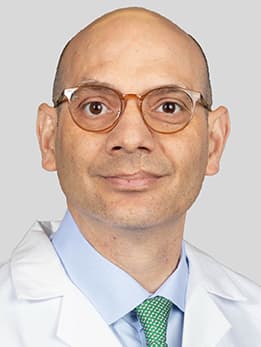‘Hermosos nuevo pulmones’: UChicago Medicine’s Latino Transplant Program gives Northwest Indiana man ‘beautiful new lungs’

Para leer esta historia en español, haga clic aquí
As images from his chest X-ray flashed on the computer screen, Bensabio Guajardo was comforted by his nurse’s words.
“¡Mira tus hermosos pulmones nuevos!” the nurse said in Spanish — which, in English, translates to “Look at your beautiful new lungs!”
Just a few weeks earlier, 68-year-old Guajardo received a double lung transplant through the University of Chicago Medicine’s Latino Transplant Program. It is one of the only programs in the country dedicated to supporting Latino and Hispanic transplant patients and their families.
Almost everyone on a patient’s team — including UChicago Medicine hepatologists, surgeons, nurses, pharmacists and financial counselors — speaks fluent Spanish. No translators are required.
“There’s a certain amount of relief when we can communicate directly in their native language. It feels more personal, like you’re closer to home,” said Pablo G. Sanchez, MD, PhD, a native Argentinean and surgical director of the lung transplant program at UChicago Medicine.
“I always stay and talk with the patients’ families,” Sanchez said. “I summarize what’s going on in Spanish and ask, ‘Do you have any questions?’ or ‘Do you need anything else?’”
Guajardo, who is from Mexico, speaks English fluently but still chose to speak both languages with his transplant team. The bilingual staff was particularly beneficial to his wife, Juanita, who oversees his care.
Juanita spoke with transplant pharmacist Lisa Potter about medications; talked to Sanchez about the surgery; and discussed aftercare with nurse practitioner Flor Cerda — all in Spanish.
“It allowed my wife to speak freely and understand everything that was happening,” Guajardo said.

Pulmonary fibrosis leads to lung transplant
After retiring from a 34-year career at U.S. Steel, Guajardo started feeling short of breath while doing routine tasks. He stubbornly insisted he was fine.
Soon, Guajardo’s breathing became so strained that he agreed to see a doctor. In 2017, he was diagnosed with severe sleep apnea and pulmonary fibrosis, a chronic lung disease that would gradually worsen his breathing.
Within a year, Guajardo needed to use a transportable oxygen tank with a mask to help him breathe. The pulmonary fibrosis continued to worsen, requiring more oxygen. Even a walk from his bed to the couch would exhaust him.
“I was trying to be strong-headed because I didn’t want to accept that I was really sick,” Guajardo said. “But my health was going down, down, down.”
After frustrating experiences at other hospitals, Guajardo, who lives in Trail Creek, Indiana, found his way to UChicago Medicine in Hyde Park — the same place where two of his four adult children had major surgeries decades earlier.
A pulmonary team that included Anila Khan, MD, and Kevin Tsui, MD, studied Guajardo’s case and determined he needed a lung transplant. Guajardo was referred to the Latino Transplant Program and added to the waitlist for donor lungs in August 2023.
As he waited, the then-278-pound Guajardo worked with UChicago Medicine’s ACTNOW clinic to lose weight, which helps transplant patients who need to lose weight in order to have a successful surgery. By changing his diet and using a semaglutide weight-loss drug, he lost nearly 100 pounds over 10 months.
Still, Guajardo’s lungs were getting worse. He landed in the UChicago Medicine emergency department in April and spent several weeks in the intensive care unit. Sanchez described him as “very, very sick.”

After transplant, ‘an absolutely new man’
Just in time to save Guajardo’s life, a set of donor lungs became available in early May 2024. A “bloodless” transplant surgery — a specialized procedure that uses precise surgical techniques to minimize blood loss — quickly followed.
Although bloodless transplant surgeries were developed to treat patients with certain religious beliefs, they’re now widely performed. UChicago Medicine's transplant team translated these techniques for lung transplants, since Sanchez said they result in better outcomes and lower risk of graft dysfunction, infection, arrhythmias and stroke.
Guajardo’s 10-hour surgery was a success.
“The day after, he looked like an absolutely new man,” Sanchez said.
Two days later, Guajardo was walking the hospital halls without needing oxygen. He hasn’t needed it since. He returned home 19 days after his transplant, which is weeks earlier than normal. Cerda, the nurse practitioner, partially attributed the recovery to strict compliance with aftercare instructions.
“Ben and Juanita have had a very positive outlook and have done everything they’ve needed to do to ensure a quick and easy recovery,” Cerda said. “They’re just wonderful people to take care of.”
Guajardo’s prognosis is excellent, but now he must take care of his lungs, Sanchez said. That means being cautious about viruses and knowing the side effects of his medication, including a higher risk of skin cancer.
Still, Guajardo can now resume his beloved fishing hobby — but he must wear a hat, long sleeves and sunscreen.
“We want to give our patients normalcy back, but it’s a new level of normal with more precautions,” Sanchez said.
Photos of the Guajardo family
Reducing transplant disparities for Latinos
Latinos account for nearly 20% of the U.S. population, according to the U.S. Census Bureau. But many who need organ transplants face socioeconomic inequities that can hinder the process.
Latinos also have a higher risk of diseases that lead to organ failure — including liver diseases, Type 2 diabetes, high blood pressure and kidney disease.
In 2020, only about one-third of Hispanics (the demographic measured by the U.S. Department of Health and Human Services) waiting for any organ transplant received one, compared to nearly half of white patients, federal data shows. That disparity includes lung transplants, according to a 2023 study in the Annals of Thoracic Surgery.
The Latino Transplant Program aims to help patients “navigate the clinical, surgical, emotional and financial complexities of transplantation,” Sanchez said. “In addition, we aim to educate and empower the Latino population so they can self-advocate for equitable access to healthcare.”
Guajardo said he feels blessed to have received a double lung transplant at UChicago Medicine. In a matter of weeks, he went from being in critical condition in the ICU back to his normal life.
In October, he’ll walk down the aisle at his son’s wedding — and he won’t be carrying an oxygen canister.
“My grandson, who is 7, said, ‘Grandpa, when the doctor fixes you, can you go outside and play football with me?’” Guajardo said. “I told him the doctor hasn’t cleared me to do that, but I said ‘I’m going to do it real soon.’”

Pablo G. Sanchez, MD, PhD
As a renowned lung transplant surgeon, Dr. Sanchez provides compassionate, care-centered treatment to patients with end-stage lung disease.
See Dr. Sanchez's physician bioLatino Transplant Program
The Latino Transplant Program (Programa de Trasplantes para Hispanos) at UChicago Medicine is one of only a few in the country dedicated to supporting Spanish-speaking Latino and Hispanic patients and their families.
Learn more about the Latino Transplant Program